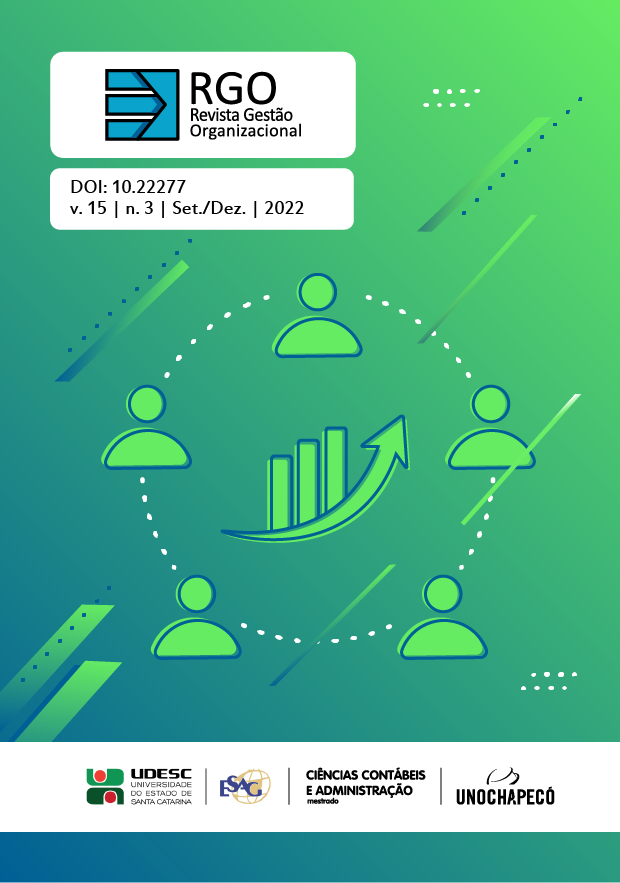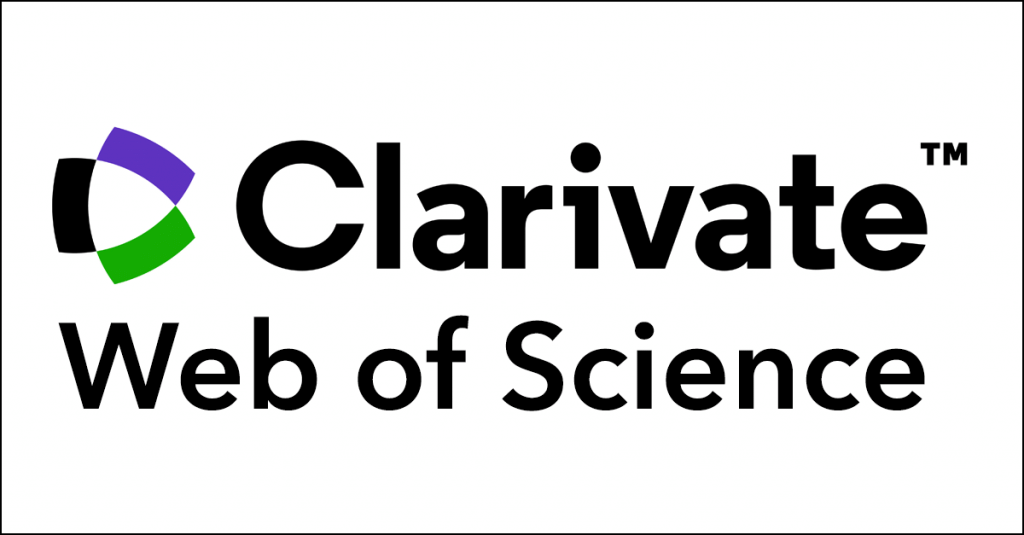EPISTEMOLOGICAL THINKING ABOUT ACCOUNTING IN THE ERA OF ARTIFICIAL INTELLIGENCE
DOI:
https://doi.org/10.22277/rgo.v15i3.6877Palavras-chave:
New technologies. Accounting Sciences. Artificial intelligence. Epistemology.Resumo
Purpose: the objective of this study was to position accounting among the branches of human knowledge in order to understand the effects of these changes on it. The central line on which the discussion unfolds is what defines it as a science and whether, as a science, it can cease to exist.
Method/approach: we adopted the Theoretical Essay as our methodology.
Main findings: the future of accounting is a recent topic in several worldwide journals and there is a unanimous understanding that accounting will not cease to exist, it should only seek in essence its reason for existing to remain competitive in the face of automated processes, acting mainly in the creation, interpretation and data authentication and reporting for decision making and no more manual processes. This study explores the ways in which the accounting sciences will be able to remain at the forefront of knowledge and as a profession of high importance for organizations.
Theoretical, practical/social contributions: the evolution of digital technologies such as Internet of Things (IoT), Big Data and Artificial Intelligence for business (BI) has provoked discussions about the future of professions, especially those that present data collection and processing activities. From this perspective, the essay contributes by directing the discussion to accounting and reflecting on the transformation of accounting science with increasing emphasis on report creation, interpretation, and authentication.
Originality/relevance: the originality of the study lies in establishing links between accounting science and disruptive technologies.
Downloads
Referências
Aranha, J. A. M. (2002). A classificação científica da Contabilidade. Revista Econômica & Pesquisa, Araçatuba, 4, 4, 100-108.
Arnold, V. (2018). The changing technological environment and the future of behavioural research in accounting. Accounting & Finance, 58(2), 315-339.
Arnold, V., Hunton, J. E., & Sutton, S. G. (2000). On the death and dying of originality in the workplace: a critical view of enterprise resource planning systems’ impact on workers and the work environment. In University of South Florida Working Paper.
Association of International Certified Professional Accountants (AICPA). (2017). The Future of the Accountancy Career.
Atzori, L., Iera, A., & Morabito, G. (2010). The internet of things: A survey. Computer networks, 54(15), 2787-2805.
Azevedo, S. U., da Silva Barbosa, J., Consoni, S., & Espejo, M. M. D. S. B. (2020). Postura ontológica da pesquisa em contabilidade gerencial. Brazilian Journal of Business, 2(3), 2927-2947.
Bunge, M (1980). Epistemologia: curso de atualização. São Paulo: EDUSP.
Bhimani, A., & Bromwich, M. (2009). Management accounting in a digital and global economy: the interface of strategy, technology, and cost information. Accounting, organizations & institutions, 85-111.
Bhimani, A., & Willcocks, L. (2014). Digitisation, ‘Big Data’ and the transformation of accounting information. Accounting and Business Research, 44(4), 469-490.
Borba, F. S., & de Oliveira Longo, B. N. (1996). Ciência & Arte & técnica: a delimitação dos sentidos num dicionário. ALFA: Revista de Linguística, 40.
Burrell, G., & Morgan, G. (2017). Sociological paradigms and organisational analysis: Elements of the sociology of corporate life. Routledge.
Burke, P. (1992). A nova história, seu passado e seu futuro. A escrita da história: novas perspectivas. São Paulo: UNESP.
Carnegie, G. D. (2014). The present and future of accounting history. Accounting, Auditing & Accountability Journal, 27(8), 1241-1249.
Carnegie, G. D., & Napier, C. J. (2012). Accounting's past, present and future: the unifying power of history. Accounting, Auditing & Accountability Journal, 25(2), 328-369.
Chen, H. J., Yan Huang, S., Chiu, A. A., & Pai, F. C. (2012). The ERP system impact on the role of accountants. Industrial Management & Data Systems, 112(1), 83-101.
Dastjerdi, A. V., & Buyya, R. (2016). Fog computing: Helping the Internet of Things realize its potential. Computer, 49(8), 112-116.
Elbashir, M. Z., Collier, P. A., & Sutton, S. G. (2011). The role of organizational absorptive capacity in strategic use of business intelligence to support integrated management control systems. The Accounting Review, 86(1), 155-184.
Elias, L. M., Padilha, S., Luz, T., Casagrande, J. L., & Birochi, R. (2014). Os paradigmas interpretativista, funcionalista, humanismo radical e estruturalismo radical adotados no estudo sobre estratégia. IV Colóquio Internacional de Epistemologia e Sociologia das Ciências da Administração.
Fădur, C. I., & Ciotină, D. (2011). Is the future of accounting compatible with the accounting of the future? Editorial Board, 55.
Faria Bilhim, J. A., & de Oliveira Gonçalves, A. Abordagens Epistemológicas e Pluralismo na Pesquisa em Contabilidade: para além do paradigma dominante. lic Scie, 59-75. In: Public, Sciences & Policies, Instituto Superior de Ciências Sociais e Políticas – Universidade de Lisboa 2021.
Fernandez, D., & Aman, A. (2018). Impacts of Robotic Process Automation on Global Accounting Services. Asian Journal of Accounting and Governance, 9, 123-132.
Feussler,W., Jarvis, D., Lin, S., & Nordman, C. (2013). Accelerating Performance: The Evolving Role of the CFO. IBM Center For Applied Insights. New York: IBM. Disponível em < https://www-935.ibm.com/services/au/en/attachments/pdf/The_Evolving_Role_of_the_CFO.pdf>. Acesso em 12 jan. 2019.
Freeman, M., & Wells, P. (2015). Reducing the expectation gap: using successful early career graduates to identify the capabilities that count. Future Proofing the Profession: Preparing Business Leaders and Finance Professionals for, 2025, 67-78.
Fogarty, T. J. (2014). A dream deferred: Interdisciplinary accounting in the US. Accounting, Auditing & Accountability Journal.
Frey, C. B., & Osborne, M. A. (2017). The future of employment: How susceptible are jobs to computerisation? Technological forecasting and social change, 114, 254-280.
Gomes, D. (2008). The interplay of conceptions of accounting and schools of thought in accounting history. Accounting History, 13(4), 479-509.
Gomes, D., Carnegie, G. D., Napier, C. J., Parker, L. D., & West, B. (2011). Does accounting history matter? Accounting History, 16(4), 389-402.
Gubbi, J., Buyya, R., Marusic, S., & Palaniswami, M. (2013). Internet of Things (IoT): A vision, architectural elements, and future directions. Future generation computer systems, 29(7), 1645-1660.
Guthrie, J., & D. Parker, L. (2014). The global accounting academic: what counts! Accounting, Auditing & Accountability Journal, 27(1), 2-14.
Guthrie, J., & Parker, L. D. (2016). Whither the accounting profession, accountants and accounting researchers? Commentary and projections. Accounting, Auditing & Accountability Journal, 29(1), 2-10.
Hopwood, T. (1994). Accounting as social and institutional practice (Vol. 24). Cambridge University Press.
Iudícibus, S. (2009). Teoria da Contabilidade. 9.ed. São Paulo: Atlas.
Iudícibus, S. D., Martins, E., & Carvalho, L. N. (2005). Contabilidade: aspectos relevantes da epopéia de sua evolução. Revista Contabilidade & Finanças, 16(38), 7-19.
Johnson, H. T. (1981). Toward a new understanding of nineteenth-century cost accounting. The accounting review, 56(3), 510.
Jordan, A. S. (1999). The impact technology is having on the accounting profession. Journal of Accounting Education, 2(17), 341-348.
Lahr, C. (1950). Manual de filosofia. 5.ed. Porto: Livraria Apostolado da Imprensa.
Laughlin, R. (2011). Accounting research, policy and practice: worlds together or worlds apart? Academic Leadership Series, 2, 21-32.
LaValle, S., Lesser, E., Shockley, R., Hopkins, M. S., & Kruschwitz, N. (2011). Big data, analytics and the path from insights to value. MIT sloan management review, 52(2), 21-32.
MacCrory, F., Westerman, G., Alhammadi, Y., & Brynjolfsson, E. (2014). Racing with and against the machine: Changes in occupational skill composition in an era of rapid technological advance.
Manyika, J., Lund, S., Chui, M., Bughin, J., Woetzel, J., Batra, P., ... & Sanghvi, S. (2017). Jobs lost, jobs gained: Workforce transitions in a time of automation. McKinsey Global Institute.
Marconi, M. D. A., & Lakatos, E. M. (2007). Fundamentos de metodologia científica. 5. ed.-São Paulo: Atlas.
McKendrick, N. (1970). Josiah Wedgwood and cost accounting in the Industrial Revolution. The Economic History Review, 23(1), 45-67.
Miller, P., Hopper, T., & Laughlin, R. (1991). The new accounting history: an introduction. Accounting, Organizations and Society, 16(5-6), 395-403.
Nepomuceno, V. (1996). A teoria do conhecimento contábil: o pragmatismo norte-americano. Revista do CRC do Rio Grande do Sul, (87), 3-17.
Pereira, R. C. M., da Silva Constantino, F. D. F., Sauerbronn, F. F., & da Silva Macedo, M. A. (2019). Pesquisa qualitativa em contabilidade: Um panorama de sua evolução no congresso ANPCONT à luz da literatura internacional. Revista Contemporânea de Contabilidade, 16(41), 204-224.
Popper, K. (2014). Conjectures and refutations: The growth of scientific knowledge. routledge.
Rikhardsson, P., & Yigitbasioglu, O. (2018). Business intelligence & analytics in management accounting research: Status and future focus. International Journal of Accounting Information Systems, 29, 37-58.
Roslender, R. (Ed.). (2017). The Routledge companion to critical accounting. Routledge.
Roos, G. (2015). Technology-driven productivity improvements in the professional services industry. Academic Leadership Series, 6, 41-50.
Ryan, B., Scapens, R. W., & Theobald, M. (2002). Research method and methodology in finance and accounting.
Sá, A. L. (2002). Teoria da contabilidade. São Paulo: Atlas, 3ª ed.
Saviani, D. (2012). Origem e desenvolvimento da pedagogia histórico-crítica. Exposição na Mesa Redonda “Marxismo e Educação: Fundamentos Marxistas da Pedagogia Histórico-Crítica” realizada no VII Colóquio Internacional Marx e Engels, no IFCH-UNICAMP em julho de, 201(2).
Schmidt, P. (1998). A classificação da contabilidade dentre os ramos do conhecimento humano. Caderno de Estudos, (17), 01-17.
Schmidt, P., & de Medeiros Gass, J. (2018). Estudo Comparativo Entre A História Da Contabilidade Tradicional E A Sua Nova História. Ciência & Trópico, 42(2).
Silva, L. S., & Pereira, R. B. M. (2018). A contribuição da religião para o nascimento da contabilidade. UNITAS-Revista Eletrônica de Teologia e Ciências das Religiões, 5(2), 1088-1105.
Souza Padilha, M. I. C., & Borenstein, M. S. (2005). O método de pesquisa histórica na enfermagem. Texto & Contexto Enfermagem, 14(4), 575-584.
Susskind, R. E., & Susskind, D. (2015). The future of the professions: How technology will transform the work of human experts. Oxford University Press, USA.
Tesche, C. H., Vendruscolo, C. O., Alves, C. B., Wayerbacher, L., Schwez, N., & Dalbén, O. J. B. (1992). Contabilidade: ciência, técnica ou arte? Contabilidade Vista & Revista, 4(1), 23-33.
Tucker, I. (2017). Are you ready for your robots? Strategic Finance, 99(5), 48-53.
Vergara, S. C., & Caldas, M. P. (2005). Paradigma interpretacionista: a busca da superação do objetivismo funcionalista nos anos 1980 e 1990. RAE-revista de administração de empresas, 45(4), 66-72.
Vermesan, O., Friess, P., Guillemin, P., Gusmeroli, S., Sundmaeker, H., Bassi, A., ... & Doody, P. (2011). Internet of things strategic research roadmap. Internet of things-global technological and societal trends, 1(2011), 9-52.
Willcocks, L. P., Lacity, M., & Craig, A. (2015). The IT function and robotic process automation
Downloads
Publicado
Como Citar
Edição
Seção
Licença
Estou ciente de que, em sendo aprovado, a publicação do artigo será no formato on-line na RGO.
Também tenho ciência de que há autorização para assumir contratos adicionais separadamente, para distribuição não-exclusiva da versão do trabalho publicada nesta revista (ex.: publicar em repositório institucional ou como capítulo de livro), com reconhecimento de autoria e publicação inicial nesta revista.
Do ponto de vista do Creative Commons, a Revista Gestão Organizacional é de acesso aberto e irrestrito, porém não permitindo adaptações nos artigos, nem o uso comercial.
Sobre a licença Creative Commons: As licenças e instrumentos de direito de autor e de direitos conexos da Creative Commons forjam um equilíbrio no seio do ambiente tradicional “todos os direitos reservados” criado pelas legislações de direito de autor e de direitos conexos. Os nossos instrumentos fornecem a todos, desde criadores individuais até grandes empresas, uma forma padronizada de atribuir autorizações de direito de autor e de direitos conexos aos seus trabalhos criativos. Em conjunto, estes instrumentos e os seus utilizadores formam um corpo vasto e em crescimento de bens comuns digitais, um repositório de conteúdos que podem ser copiados, distribuídos, editados, remixados e utilizados para criar outros trabalhos, sempre dentro dos limites da legislação de direito de autor e de direitos conexos.
A Revista Gestão Organizacional adota o sistema: Atribuição-SemDerivações-SemDerivados CC BY-NC-ND: Permite o download dos seus trabalhos e o compartilhemento desde que atribuam crédito, mas sem que possam alterá-los de nenhuma forma ou utilizá-los para fins comerciais.























